“Lorna,” whispered Herb. “Lorna, are you all right?” He stood at the end of the hall.
“Oh, Herb,” she said. “I’ve had a wonderful idea. Look at these — oh — ” She wished she could tell him, right then, tell him that there was something about her that made her extraordinary.
“What is it, Lorna?” asked Herb.
“Oh,” she said, shrugging, abandoning the idea of telling him everything, “nothing. I was just looking at these charms.”
Herb came to her side and looked over her shoulder. “Mm-hmm,” he said.
“And I was thinking — well — I was thinking that I could do better than this. Look.”
Herb looked closely. “Sure you could,” he said. “Those little dogs and horses you carved for your Uncle Luther were much better than this stuff.”
“They were,” said Lorna. “Yes, they really were. Herb — ”
“Mmm?” he said, still studying the charms.
“The article says that most of them have moving parts.”
“Mm, I can see that.” His mind was racing. These are nothing. Children could have designed these. He wanted to tell her what he could do along these lines, what he had already done. She’d be amazed, amazed. “A mechanical genius,” Ben said. He had half a mind to go to the cellar and get his Watchcase Wonders from the hidden compartment in the box on the shelf under his workbench, bring them upstairs, and show them to her. They would give her something to look up to me for, get her mind off those grinning boys. Look up to me? Not likely. She’d be more ashamed than amazed. “Not much to most of these,” he said. “Mechanically, I mean. The propeller goes around on the plane, the wheels rotate on the wagon, the telephone dial turns, the safe door opens. I could — ” He stopped and looked at Lorna. She was beaming. “I could do much better than this,” he said.
“We could work together,” said Lorna.
“We could,” said Herb. “I could do the mechanical work.”
“And I could make the little figures.” Her heart was pounding. She wanted to tell him. She came close to telling him, very close to telling him. He was bent close to the pictures of charms, examining them, and reciting their mechanical attributes: “ — little egg beater goes around, the fan blades turn — ” The charms seemed so innocent. Herb seemed so innocent, so trusting, such a truth-teller. She felt deceitful. And lustful. She didn’t dare tell him. Didn’t dare. It had been those boys — surely he would be able to tell that it had been those boys. She wondered how she could even have thought of it. She had been holding her finger in another part of the magazine, marking the place where the statues were shown. She slipped her finger out.
HERB MADE some sketches, and together they made some prototypes — a tiny silver toaster from which two slices of burnt toast, slivers of walnut wood, emerged; a Studebaker President convertible with a folding top, a working steering wheel, and a hinged hood and doors; and a minuscule piano with four keys that actually struck notes (the first four notes of “Lake Serenity Serenade,” which had become a standard) — but then the project began to wither. Their hearts weren’t in it. They wanted to work together, and they wanted to work on jewelry, but they didn’t want to make toasters, convertibles, and pianos. They seemed to find less and less time to work on the prototypes, and after a few months they found no time at all. The toaster, convertible, and piano became the most-coveted charms worn by any of the girls at Babbington High, where Ella wore them, on her bracelet, every day, until the fad for charms faded and she put them into a box in a dresser drawer where she kept other outmoded jewelry.
In Topical Guide 348, Mark Dorset considers Collaboration, Cooperation from this episode.
Have you missed an episode or two or several?
You can begin reading at the beginning or you can catch up by visiting the archiveor consulting the index to the Topical Guide.
You can listen to the episodes on the Personal History podcast. Begin at the beginning or scroll through the episodes to find what you’ve missed.
You can ensure that you never miss a future issue by getting a free subscription. (You can help support the work by choosing a paid subscription instead.)
At Apple Books you can download free eBooks of “My Mother Takes a Tumble,” “Do Clams Bite?,” “Life on the Bolotomy,” “The Static of the Spheres,” “The Fox and the Clam,” “The Girl with the White Fur Muff,” “Take the Long Way Home,” “Call Me Larry,” and “The Young Tars,” the nine novellas in Little Follies, and Little Follies itself, which will give you all the novellas in one handy package.
You’ll find overviews of the entire work in An Introduction to The Personal History, Adventures, Experiences & Observations of Peter Leroy (a pdf document) and at Encyclopedia.com.

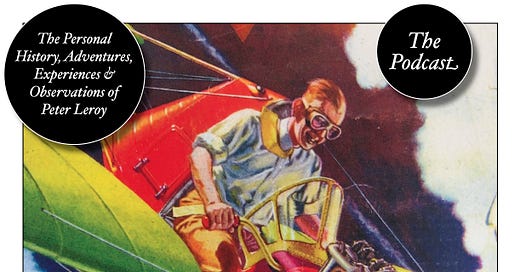





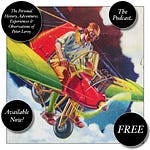



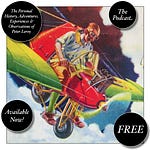
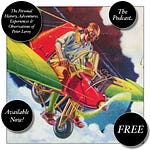
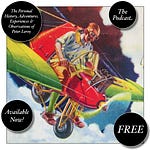
Share this post